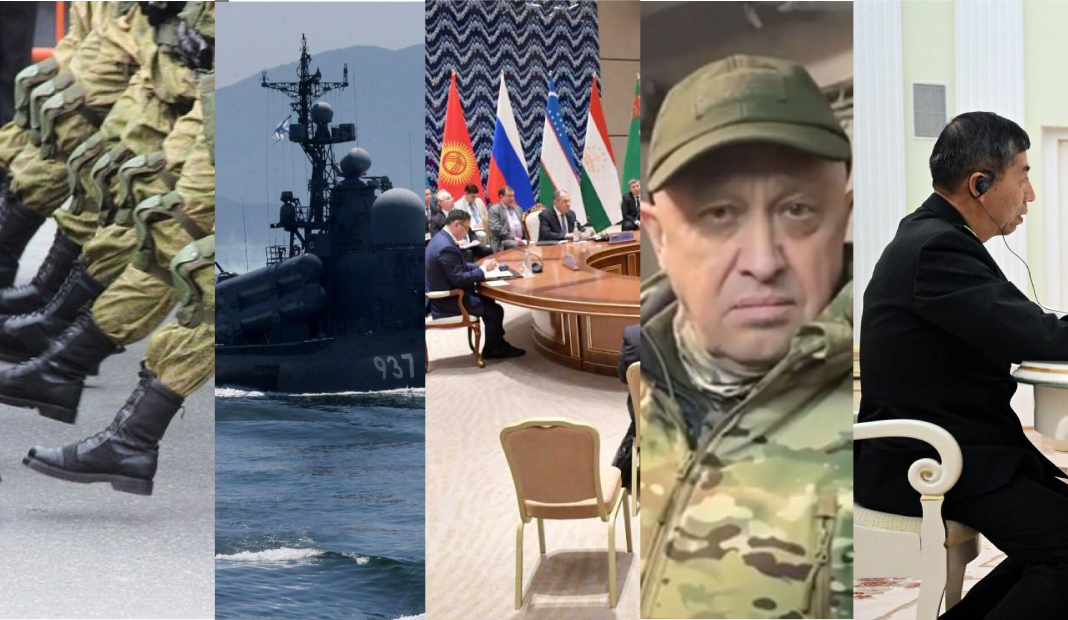This report describes the key events that had an important impact on the political, economic and social processes inside Russia.
Based on the results of the past week, the following trends can be summarised:
- Active militarisation of society continues in Russia, which is another evidence of preparations for protracted conflicts that will not be limited to Ukraine. In general, this factor should be considered as a regional trend as a whole, where the militarisation process takes place not only within Russia but also in a number of other states that build partnerships with Moscow or demonstrate tacit agreement with its actions (China, India, Iran, countries Middle East). This factor is usually considered a local threat (in the case of Ukraine, Taiwan or other regional conflicts). At the same time, such trends may also indicate a more global threat into which many states or military blocs will be drawn.
- In foreign policy, Putin emphasises the need to strengthen ties with China and Central Asia. This region is gradually turning into a “closed territory” over which Moscow and Beijing are trying to gain control. At the same time, some factors and features of this region demonstrate the risks of destabilising the situation, which could negatively impact Russia’s plans.
- Russia is increasingly demonstrating its fatigue with the Ukraine issue, leading Moscow into an increasingly deadlocked situation. On the eve of the presidential elections, the issue of the so-called “SMO”, which dragged on for more than a year, requires the adoption of urgent and effective decisions. Moreover, the activation of Russia in Central Asia and the Asia-Pacific region demonstrates the presence of no less important areas in Russia’s foreign policy strategy, which cannot be implemented in the presence of the Ukrainian issue. Soon we should expect a radical change in the Kremlin’s position on Ukraine, up to an attempt to freeze the conflict or turn it into a negotiation process.
During April 10th-16th the following topics were the most relevant for Russia:
- Adoption of the law “On military duty and military service”
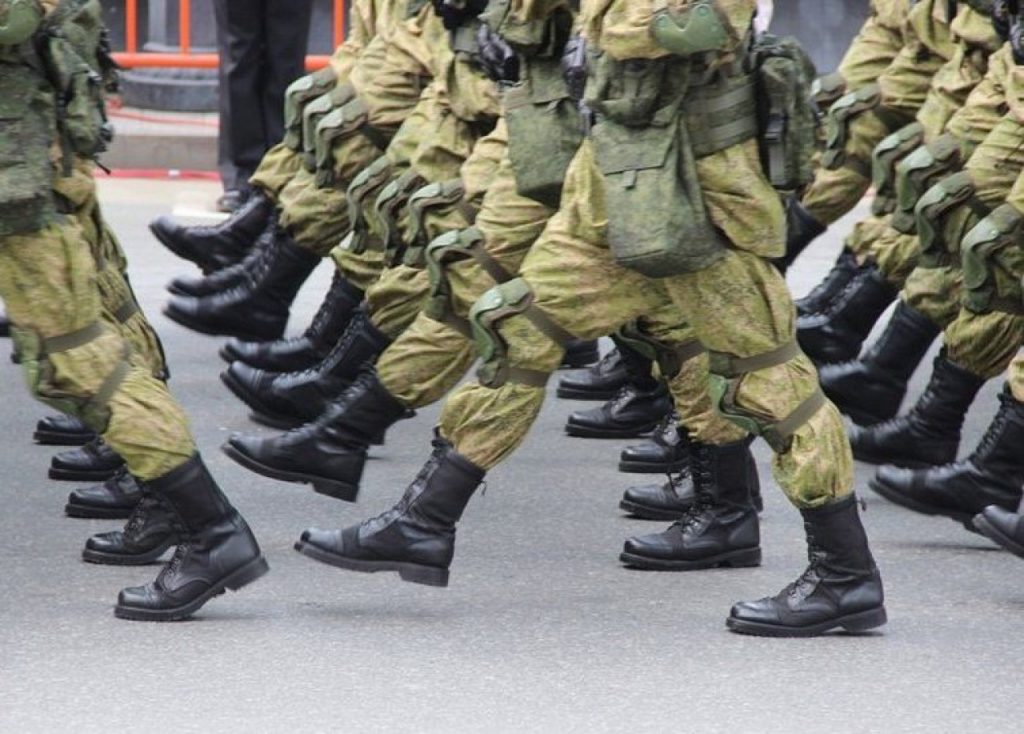
On Tuesday, April 11, the State Duma of the Russian Federation adopted amendments to the law’s second and third readings, “On military duty and military service.” The next day, these amendments were approved by the Federation Council, and on April 14, a new version of the law was signed by Vladimir Putin. The latest version of the law equates electronic summonses to paper ones and, for evaders, introduces a ban on leaving the country, transport management, and some property transactions, and also changes several other rules related to recruitment for contract service.
Key changes:
- New ways of sending subpoenas are being introduced: by registered mail, electronically through the State Services portal, and delivery through the MFC (multifunctional centre). However, the old methods – delivery of the summons in the hands and through the employer – will be preserved.
- Once the summons is considered served, the person liable for military service cannot leave Russia. Restrictions will be in effect until the conscript appears at the military registration and enlistment office.
- Failure to appear without a valid reason after 20 days will entail a ban on state registration as an individual entrepreneur; a prohibition on state registration of vehicles; a pause in the cadastral registration of immovable property or the registration of rights; restriction on driving; refusal to conclude a loan agreement, loan agreement; a ban on registration with the tax authority of an individual as a taxpayer applying the special tax regime “tax on professional income”.
- Regional authorities can introduce additional restrictions for dodgers (for example, to receive payments, benefits, and support measures); they can be appealed. However, restrictions will be lifted after the appearance in the military registration and enlistment office.
Outcomes and outlook:
Notably, a very resonant bill was adopted in a tense atmosphere, and several deputies openly declared a severe violation of the regulations since about 130 pages of amendments were submitted for consideration by deputies an hour and a half before the vote. However, the voting took place in a package manner – without considering the amendments. As a result, the bill was supported in the third reading by 396 deputies of the State Duma.
An additional resonance around this law is also caused by the fact that for the first time since the collapse of the USSR, military registration in Russia has become total, not on paper but in reality. The document’s authors have already stated that no similar laws exist worldwide.
In addition to the most discussed innovations regarding electronic summonses and the ban on travelling abroad, the creation of
the Russian command and authorities estimate an up-to-date information base for the entire mobilisation resource at 25-35 million people. Before the law’s adoption, this resource was conditional since it existed only on paper – it is not known which part of it is fit for service and where the conscripts are generally located. After the adoption of the law, it will be possible, as quickly as possible, to drive almost all Russians of draft age through the military registration and enlistment offices (by sending subpoenas demanding to appear for clarification of data) and to establish their readiness for service, as well as their place of residence, marital status and other parameters.
Undoubtedly, this process will require considerable time and cannot be completed in one draft campaign (in Russia, it started on April 1 and will last until July 15). At the same time, one should still expect a significant increase in conscripts, which will increase with each subsequent conscription campaign. This is probably the main strategic goal of innovation.
At the same time, the new system for distributing summonses and limiting the number of opportunities for those who did not show up to the military registration and enlistment office on time not only sped up the process of mobilisation but also made it possible to effectively deal with the opposition-minded part of the population, which during the mobilisation actively left for other countries and publicly criticised Putin’s actions. Under the new legislation, in the future, they may lose any opportunity to work or even move freely in Russia.
Given the gradual transition of the Russian economy to a military footing, this law also supports the Kremlin’s strategy with manpower, which can significantly increase, demonstrating new threats and challenges not only for Ukraine but for the whole of Europe.
From the point of view of Russian propaganda, soon, one will hear about the expansion of NATO and the need to respond by increasing the number of Russian troops, especially along the border with the countries of the North Atlantic Alliance, which has almost doubled for Russia.
- Meeting of the CIS Foreign Ministers Council in Samarkand
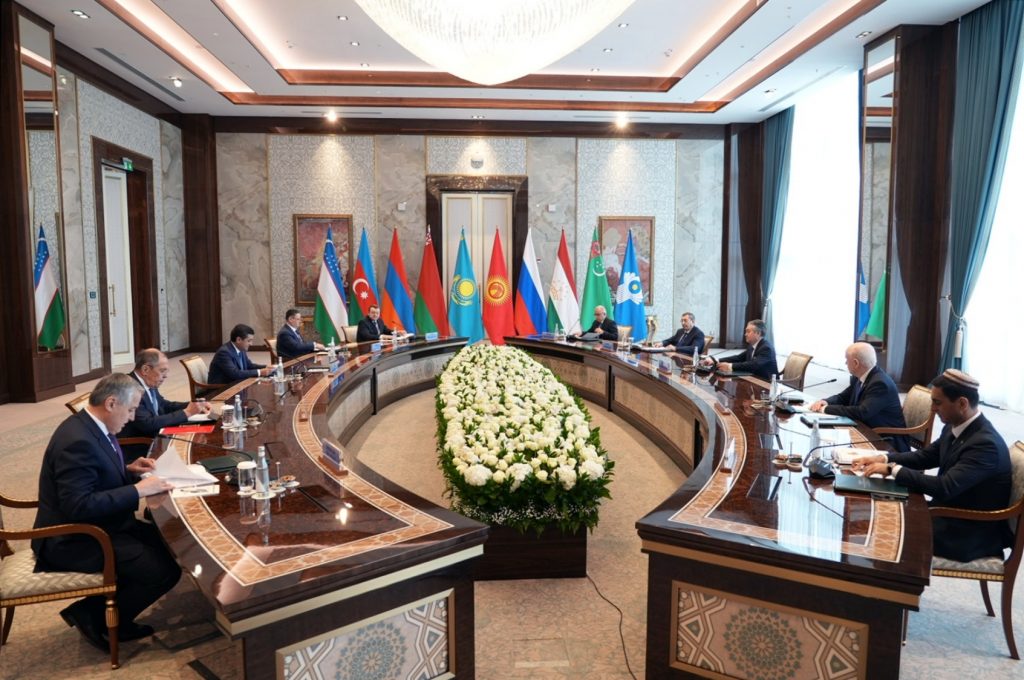
On Friday, April 14, a regular meeting of the Council of Foreign Ministers (CMFA) of the Commonwealth of Independent States (CIS) was held in Samarkand (Uzbekistan). The heads of the foreign ministries of Azerbaijan, Armenia, Belarus, Kazakhstan, Kyrgyzstan, Russia, Tajikistan and Uzbekistan, and the CIS Executive Committee attended the event. In addition, Deputy Minister of Foreign Affairs Vepa Khadzhiev represented Turkmenistan. As a result of the meeting, the Council members approved several documents that will be submitted for approval during the upcoming meetings of the Council of Heads of State and the Council of Heads of Government of the CIS.
Outcomes and outlook:
Even after more than 30 years, Russia is trying to revive the Commonwealth of Independent States as a kind of form of economic integration in the post-Soviet space. The association, originally conceived as a temporary one (for a “civilized divorce” after the collapse of the USSR), continues to exist – despite the accumulating internal contradictions. First of all, it is a “club of former Soviet republics” (with the exception of some that have disappeared due to political evolution). Russia plays a dominant role in the CIS and is trying to turn the Commonwealth into a kind of analogue of the “Council for Mutual Economic Assistance”, which existed in the 50s – 80s and united the countries of the socialist choice and pro-Soviet orientation.
The fact that rather meager releases followed after the meeting in Samarkand testifies only to the ritual nature of the meeting – without concrete results. Obviously, it is important for Russia to understand whether it can rely on economic support from the CIS states in the current difficult conditions, and it is also necessary to understand the degree of concessions to the same CIS countries in the supply of energy resources and other important elements of trade relations. But there is no need to talk about the effectiveness of the CIS mechanism lately – a much greater role is played by direct interstate relations between CIS members.
- Meeting in the CA5+Russia format
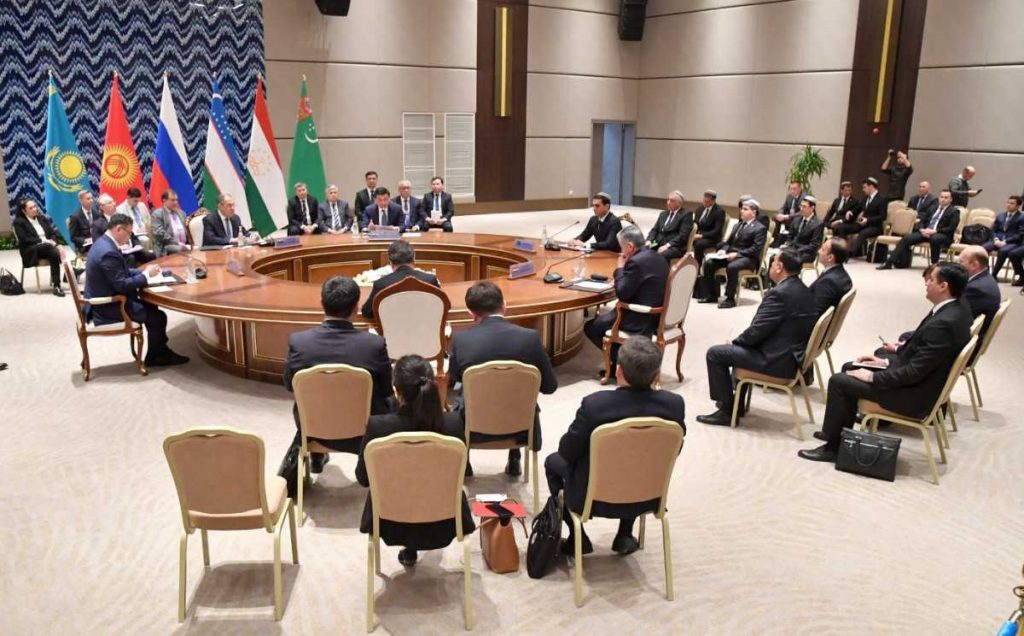
On Friday, April 14, Samarkand (Uzbekistan) hosted the sixth meeting in the CA5+Russia format, which the Ministers of Foreign Affairs of Russia, Kazakhstan, Kyrgyzstan, Tajikistan, Turkmenistan and Uzbekistan attended. According to the parties’ statements, during the meeting, they discussed cooperation between Russia and Central Asia in the political-diplomatic, trade-economic, energy, transport, humanitarian and migration fields, as well as in healthcare and sanitary and epidemiological welfare of the population.
Outcomes and outlook:
Today for Russia the most important direction in the development of international relations is the region of Central Asia. And the main task for Russia is to prevent the establishment of control over the region by the UK and the US. The fact that British interests in this region are strong, and the United States has military bases here, is well known. However, in the event of a change of regimes (through coups or “color revolutions”), the countries of the region will begin to pose a threat to the security of Russia and, in part, to China. In the near future, the struggle for Central Asia will become one of the defining nodes of the contradictions of the modern world. Western control of the Central Asian states cuts off Russian energy supplies to India, puts obstacles in the way of the Moscow-Tehran alliance, and complicates relations with the Taliban regime in Afghanistan. Plus, Central Asia is a region not so much of a clash of interests between China and Russia as an example of cooperation between the interests of two states. That is why it is important for Russia to strengthen the “countries of the underbelly” (under this term, these states often appear in the semi-official documents of the Russian Federation).
At the same time, each of the states raises a lot of questions from Moscow. Gradually losing the status of a “closed country”, Turkmenistan under a new and young leader, Serdar Berdymukhammedov, begins to pursue an increasingly independent policy and does not always coordinate its interests with those of Moscow. This applies primarily to the energy sector. Kyrgyzstan demonstrates constant instability. Tajikistan is going through hard times economically. Uzbekistan is openly flirting with the West. Kazakhstan, in principle, constantly demonstrates the independence of interests. For this reason, such meetings in the 5 + 1 format are important for Russia, first of all, to synchronize watches and strengthen ties.
- Article by Yevgeny Prigozhin, curator of Wagner PMC
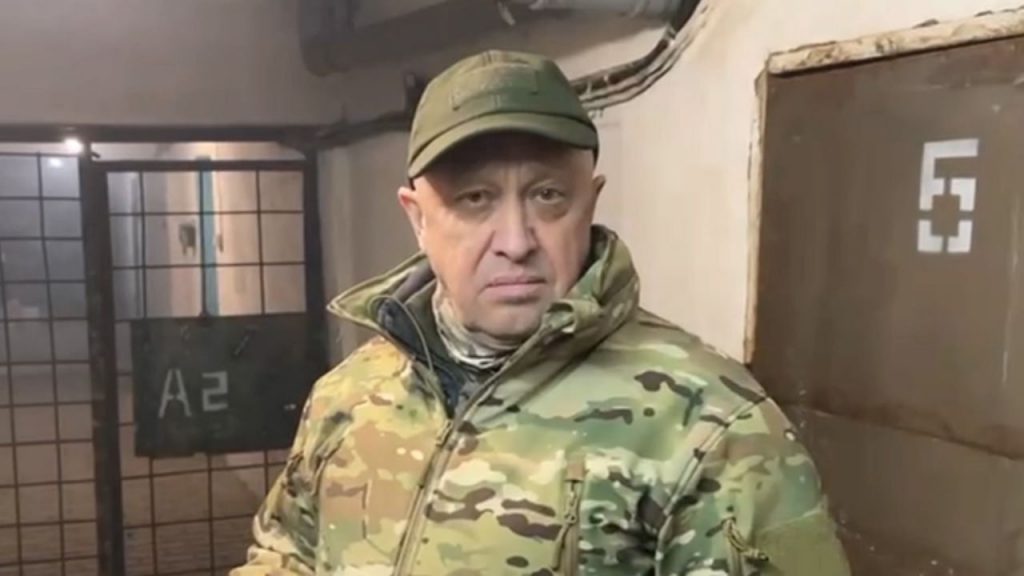
On Friday, April 14, Yevgeny Prigozhin, the curator of Wagner PMC, published his article entitled “Only a fair fight: no agreement.” In it, he made several relatively strong statements; in particular, he proposed to stop the war in Ukraine, declaring its goals achieved. However, he also said that this war could serve as a prerequisite for the split of Russia. At the same time, many Western and Ukrainian analysts took this material very ambiguously, declaring a de facto change in Prigozhin’s course and his open confrontation with Putin. Therefore, this material can be viewed from a different angle.
Key statements:
- “PMC” Wagner “continues to grind the Ukrainian army on Bakhmut. Zelensky sends more and more units into this meat grinder, into a destructive funnel that sucks in the best units of the Armed Forces of Ukraine and mercenaries.”
- “Bakhmut’s strategic role is not so great. Bakhmut is followed by Siversk, Sloviansk, Kramatorsk, Konstantinovka, Druzhkivka and Chasiv Yar: settlements that are part of the so-called “Donbas ring” and form a fortified area. On the one hand, Bakhmut is part of this fortified area; on the other hand, the capture of Bakhmut itself will not ensure a short-term victory over Ukraine, the road to the Dnieper, or even the capture of Donbas.”
- “Ukrainian army has gathered enough forces. About 200,000 already sufficiently trained fighters have undergone two to three months of training and coordination and are ready to perform combat missions. Moreover, the amount of weapons and ammunition is enough for these 200,000 to go on the offensive in various directions.”
- “The Armed Forces of Ukraine lose from 30 to 50 pieces of equipment daily and do not experience problems with it. And as they say at the front, they have unlimited people.”
- “If the Armed Forces of Ukraine do not go on the offensive shortly, they will gradually begin to lose their combat potential. As a result, the war will reach a stalemate, and territories currently under the Russian Federation’s control may remain at the disposal of the Russian Federation for years.”
- “The long battle for Bakhmut is extremely beneficial for the Russian troops because they already squeezed out a large piece of the territory of Ukraine in 2022. If the special operation remains within these boundaries, plus or minus a couple of tens of kilometres, this will solve many problems of the [so-called] SMO.”
- “Bakhmut enables the Russian army to build up strength, take advantageous defence lines, deal with internal problems, prepare the mobilised and fully equipped to meet any number of counter-attacking airmen.”
- “In the bowels of the American intelligence services, a plan has long been ripened for the next step in the complete collapse of Russia, which is fully consistent with today’s US doctrine.”
- “Today, when the special operation began, and the Russian Federation was unable to achieve the results that society expected, the United States has the opportunity to return to its original plan.”
- “The US doesn’t want a quick war. They need a war leading to the deep country’s persuasion and victory.”
- “Many of those who supported the special operation yesterday are now in doubt or categorically against what is happening. The Deep State wants to urgently return to their normal lives, old habits and comforts.”
- “For the authorities and society as a whole, it is necessary to put some bullet points in the SMO today. The ideal option is to announce its end, to inform everyone that Russia has achieved the results it planned, and in a sense, we have achieved them. We have ground a huge number of fighters of the Armed Forces of Ukraine, and we can report to ourselves that the tasks of the SMO have been completed.”
- “Russia has cut off the Sea of Azov and a large piece of the Black Sea, captured a fat piece of Ukrainian territory and created a land corridor to Crimea. So now there is only one thing left: to firmly gain a foothold and claw into existing territories.”
- “The people are already looking for someone to blame for the fact that we are not the strongest army in the world, and in this situation, they will look for the “extreme ones”.
- “Radical national feelings will rise as the Russian military industry will start working with a tenfold effort after any military defeat. Economic efficiency will crowd out sluggish, inefficient public capital.”
- “In the event that soft agreements take place, according to the American principle of gradual humiliation, the Fridmans and Chubais will be returned to Russia first, then the Khodorkovskys and Dvorkoviches. Then the elites will gradually liberalise, and the “deep state” will accept them out of a sense of self-preservation, transforming from black or red to blue or pink.”
- “Ukrainians are ready to attack. We are ready to repel the blow. The best scenario for healing Russia so that it rallies together and becomes the Strongest State is the offensive of the Armed Forces of Ukraine, in which no handouts and negotiations will be possible.”
Outcomes and outlook:
Although the most discussed thesis from Prigozhin’s article was the call for the end of hostilities and further concentration on the already occupied territories, it is worth highlighting other equally important aspects.
By all appearances, much more complicated matters lie behind Prigogine’s conditionally pacifist intentions. As Ascolta wrote, two main camps are currently lining up in Russian political circles: doves and hawks. The Kremlin controls both camps and external and internal consumers use their presence.
The conditional camp of “hawks” is increasingly trying to lead Prigozhin, demonstrating his entire readiness to go out to the bitter end, capturing not only the territories of Donbas but also all of Ukraine or several European states. For the external consumer, Prigozhin is the embodiment of absolute evil, the curator of a structure that consists of life prisoners, murderers, rapists and drug addicts who use the most barbaric methods of decapitating victims or killing them with a sledgehammer. For the domestic consumer, Prigozhin is the ideologist of the most radical part of the population, which also supports the idea of the complete occupation of Ukraine and the collapse of all of Europe.
At the same time, Vladimir Putin is increasingly playing a vital role in the dove camp, demonstrating the already well-known technology: “If not me, then people like Prigozhin or Medvedev will come.” For an external consumer, it shows that there is a chance for peace talks, which Russia allegedly does not refuse even in the current situation. For the domestic consumer, over and over again, he demonstrates the presence of a “gesture of goodwill”. Supposedly, the real power of Russia lies in the ability to forgive and help even the worst enemy, which is currently the West.
In his article, Prigozhin forms a new thesis that reinforces the process of dividing into two camps inside Russia (an essential element on the eve of the presidential elections) and creating a more stable image of a more stable image of a possible strengthening and expansion of the conflict outside Ukraine. He directly indicates that the current government has played with diplomacy and regular concessions, which in the future may lead to increased internal confrontation in Russia. At the same time, Prigozhin proposes to stop the fighting and start preparing for the next escalation stage, building up combat power and mobilisation forces.
In essence, the main point of Prigozhin’s article can be reduced to the following veiled thesis: “Either the West takes into account Moscow’s demands and conditions and sits down at the negotiating table, or Moscow freezes the conflict and begins preparations for a more global war.”
It is important to note that in addition to this thesis’s formation, Prigogine is knocking a trump card out of the West’s sleeve, declaring that any truce will be only a step towards more military severe preparation of Russia.
In any case, it is essential to note that Prigozhin is increasingly acting as a politician. Soon, there is every chance to see him as the leader of a political organisation or as a self-nominated candidate in elections in key regions or cities of Russia.
- Sudden bringing the Russian Pacific Fleet to the highest degree of readiness for verification
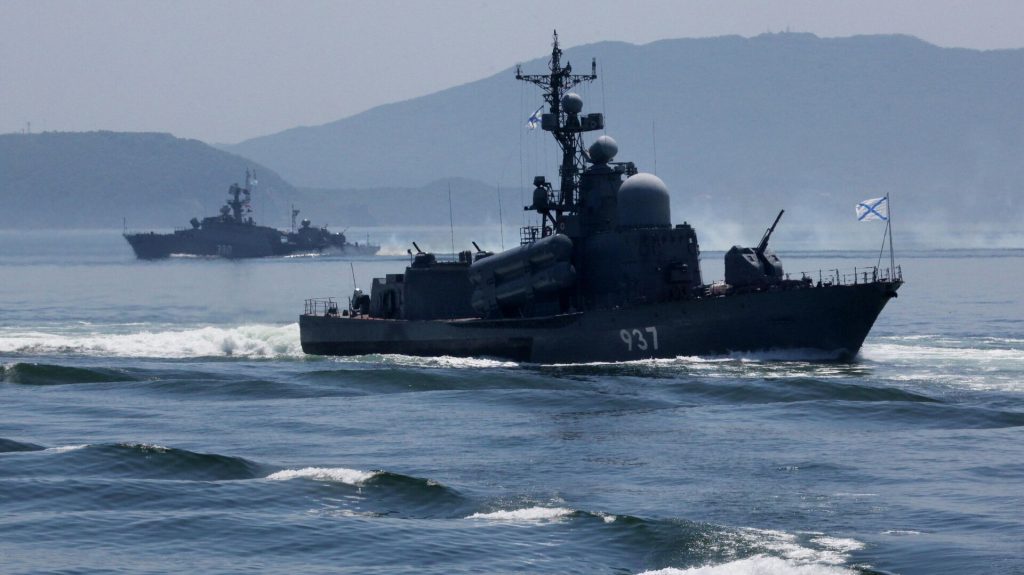
On Friday, April 14, the Pacific Fleet of the Russian Federation was brought to the highest degree of readiness for a sudden inspection. This was announced by the Minister of Defense of the Russian Federation, Sergei Shoigu, at a meeting with the department’s leadership. Shoigu also noted that the sudden check is being carried out in accordance with the decision of the Supreme Commander of the Armed Forces of the Russian Federation. The Commander-in-Chief of the Navy, Admiral Nikolai Evmenov, supervises the activities. The check also involves the Aerospace Forces, military units and support units. According to Shoigu, the main goal of the review is to increase the ability of the armed forces to repel the aggression of a potential enemy from the sea.
Outcomes and outlook:
The Pacific region is the most important direction for Russia, but recently Russia has been focusing mainly on the western and southern directions, partly talking about Arctic projects, but it seemed that the Pacific Ocean region had faded into the background. Obviously, the new activity in the Pacific is a direct consequence of Xi Jinping’s visit to Moscow and a demonstration to opponents (primarily the United States and Japan) that the Russian fleet will also take part in the event of a direct clash of interests of great states – on the side of China. In fact, since the exercise (February 14), we can talk about the Russian-Chinese naval alliance in the Pacific Ocean. This is a serious threat not only to Taiwan, but also to Japan.
By the beginning of the 2010s, the Pacific Fleet was practically unable to perform combat missions on a full scale in the oceanic theater of operations and was intended mainly to perform operational-strategic tasks in closed inland seas, escort operations, or fight against pirates. Over the past decade, the Pacific Fleet of the Russian Federation has undergone significant modernization, replenished with new ships, and in December 2022 was recognized as the best of the Russian fleets.
- Chinese Defense Minister Li Shangfu’s visit to Moscow and meeting with Vladimir Putin
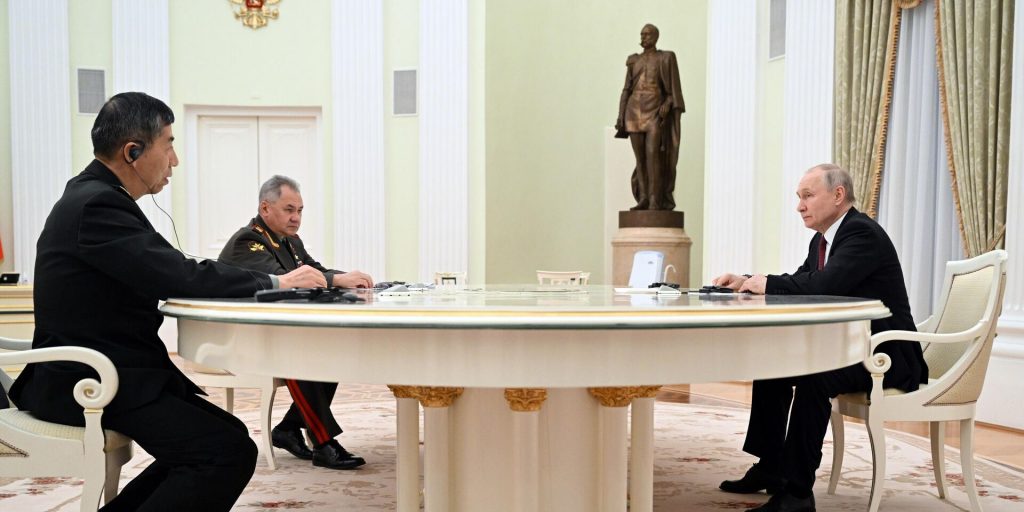
On Sunday, April 16, Li Shangfu, a member of the State Council, Minister of Defense of the People’s Republic of China, began a three-day working visit to the Russian Federation. Upon arrival in Moscow, he went to the Kremlin, where he met with Vladimir Putin and Russian Defense Minister Sergei Shoigu.
Key statements:
- Putin: “There is a very good development of relations between our countries in all areas – in the economy, social, cultural, and educational sectors. But we are also working actively through the military departments, regularly exchanging information that is useful to us, cooperating in the field of military-technical cooperation, conducting joint exercises, moreover, in different theaters: in the Far East region, and in Europe, and at sea, and on land and in the air.”
- Li Shangfu: “Recently, cooperation between Russia and China in the military and military-technical fields has been developing very well. This makes a great contribution to ensuring global and regional security.”
- Li Shangfu: “After I took the post of Minister of Defense of the People’s Republic of China, this is my first visit abroad. I specifically chose Russia for this in order to emphasize the special nature and strategic importance of our bilateral relations.”
- Li Shangfu: “We have a very strong relationship, it surpasses the military-political alliances of the Cold War, is built on the principles of non-alignment, non-opposition to a third party, and it is very stable. Under your strategic leadership and President Xi Jinping, we are actively developing cooperation in practical areas, and our relationship has already entered a new era.”
- Li Shangfu: “Mr. Xi Jinping has put forward several major initiatives, including the Civilization Initiative, the Global Development Initiative. As far as we know, the Russian side has a positive attitude towards these initiatives.”
- The main part of the meeting was held in a closed format. As of the evening of April 16, Putin’s press secretary Dmitry Peskov said that he would report the results of the negotiations later.
Outcomes and outlook:
Li Shangfu’s visit is a confirmation of Ascolta’s earlier version that the meeting between Vladimir Putin and Xi Jinping was primarily in the nature of agreements in the military-defense sphere, possibly even to the point of creating a military-political alliance. Both countries are interested in this.
The main areas that were discussed with the Chinese guest are Taiwan, the Asia-Pacific region, Africa, and Central Asia. According to Ascolta, if the issue of Ukraine was discussed during the meeting, it was only indirectly. This fact may indicate that Russia is gradually switching from Ukraine to other, more important areas, which theoretically may indicate Moscow’s readiness to negotiate with relaxed requirements.
Moreover, in this situation, it is important to note that Li Shangfu’s visit to Moscow coincided with the start of the largest military exercises in the last 25 years, Aurora-23, which will start in Sweden on April 17. 26 thousand people from 15 countries will take part in them, and they will last for a month. At the same time, US, South Korean and Japanese anti-missile exercises will take place in the Sea of Japan. During the exercises, missile interceptions will be practiced. Three destroyers equipped with the Aegis missile defense system have already entered the water area.
Apparently, these exercises can serve as a pretext for a number of joint statements by Russia and China to strengthen military cooperation.

